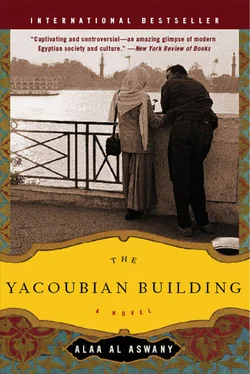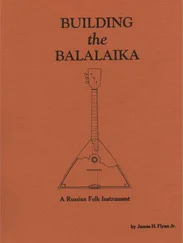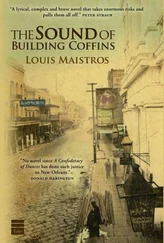Alaa Al Aswany - The Yacoubian Building
Здесь есть возможность читать онлайн «Alaa Al Aswany - The Yacoubian Building» весь текст электронной книги совершенно бесплатно (целиком полную версию без сокращений). В некоторых случаях можно слушать аудио, скачать через торрент в формате fb2 и присутствует краткое содержание. Год выпуска: 2006, ISBN: 2006, Издательство: Adobe Acrobat eBook Reader, Жанр: Современная проза, на английском языке. Описание произведения, (предисловие) а так же отзывы посетителей доступны на портале библиотеки ЛибКат.
- Название:The Yacoubian Building
- Автор:
- Издательство:Adobe Acrobat eBook Reader
- Жанр:
- Год:2006
- ISBN:978-0-06-087813-9
- Рейтинг книги:5 / 5. Голосов: 1
-
Избранное:Добавить в избранное
- Отзывы:
-
Ваша оценка:
- 100
- 1
- 2
- 3
- 4
- 5
The Yacoubian Building: краткое содержание, описание и аннотация
Предлагаем к чтению аннотацию, описание, краткое содержание или предисловие (зависит от того, что написал сам автор книги «The Yacoubian Building»). Если вы не нашли необходимую информацию о книге — напишите в комментариях, мы постараемся отыскать её.
The Yacoubian Building — читать онлайн бесплатно полную книгу (весь текст) целиком
Ниже представлен текст книги, разбитый по страницам. Система сохранения места последней прочитанной страницы, позволяет с удобством читать онлайн бесплатно книгу «The Yacoubian Building», без необходимости каждый раз заново искать на чём Вы остановились. Поставьте закладку, и сможете в любой момент перейти на страницу, на которой закончили чтение.
Интервал:
Закладка:
Busayna tried to plead with the officer, but he rebuked her sharply, saying “Shut your mouth, whore, or do you want me to make you out a morals charge right away?”
The two gave up completely and answered the officer’s questions. Zaki affirmed in his statement that the complaint was deceitful and that Dawlat was not living with him in the office. He explained Busayna’s being with him by saying that she was the daughter of a friend of his, that she’d quarreled with her family, and that he’d invited her to his apartment so that he could make peace between them. Then he signed the police report, as did Busayna and Dawlat (the plaintiff), who left after thanking the officers and satisfying herself that things were going properly. After all these insults Zaki swallowed his pride and started pleading with the officer until in the end the latter permitted him, grudgingly, to use the telephone. He called a friend of his who was a former Appeals Court judge and asked for help. The judge came quickly, his face still showing traces of sleep, and went to the office of the station head. The latter summoned Zaki, invited him to sit down, insisted on ordering him a cup of coffee, and gave him a cigarette (he had left his behind in the office during the brouhaha). Then the station head looked at him and said smilingly, in a quiet voice, “Naturally, I apologize for any affronts that my colleagues may have committed, but as you know the incident touches on morality and it’s a tricky thing. The officers here are jealous of our traditions and we’re all religious people, praise God.”
Zaki didn’t say a word. He smoked, staring at the officer, while the judge broke in to say, “I do hope, sir, we can clear all this up. I’d be very grateful.”
“Your Excellency’s requests are my command, but unfortunately the report has been entered already with a serial number and it can’t be deleted. Your Excellency knows the procedures as well as I do. All we can do is let him and the girl go tonight, and when they turn up tomorrow morning to go before the magistrate, I’ll talk to him and have him suspend the investigation, God willing.”
Zaki and Busayna signed an undertaking to appear before the magistrate, and when they left the station Zaki shook his friend the judge’s hand and thanked him. The other said, “Zaki Bey, we’re brothers. You don’t have to thank me. By the way, it’s clear your sister Dawlat has influence and all the officers are in her pocket. The head of the station could have torn up the report in front of us if he’d wanted to.”
Zaki smiled sadly and the judge said to comfort him, “Don’t worry about it. First thing tomorrow I’ll call the District Chief of Police’s office and hopefully everything’ll be okay.”
Zaki thanked him again and walked beside Busayna in the direction of the Yacoubian Building. The light of morning had started to seep into Suleiman Basha, which was empty but for the municipal workers sluggishly sweeping and a few people who either had risen early for some reason or were returning from a long night out. Zaki felt extremely tired, dizzy, and nauseous. He was neither inclined to action nor angry. All he felt was that his stomach hurt, his mind was empty, and his thoughts were scattered. Slowly he became seized by the notion that heavy sorrows were bearing down on him, like the clouds that gather swiftly before a storm. Later he will go over a hundred times the insults and abuse that they directed at him; he will never forgive himself for having meekly submitted to them; he will make a comparison — so as to hurt himself cruelly — between the respect he had known all his life and the bruising contempt with which he had been treated at the police station, where they had treated him as though he were a pickpocket or a pimp. What really wrung his heart was that he had surrendered totally. He wouldn’t have protested if they had beaten him. Why had he given up and turned into a limp rag in their hands? How had it come about that he had lost his willpower, and his self-respect had collapsed to such a degree? He ought to have resisted to the end, come what may, if not in defense of his honor, then in defense of Busayna’s reputation, which they had ruined. What would she think of him now and how would he be able to meet her eyes, after he had failed to protect her or even defend her with a word?
He turned to look at her. She was walking silently next to him. Suddenly he heard himself saying in a hoarse voice, “Come on. Let’s have breakfast at the Excelsior. You must be hungry.”
She didn’t say a word but followed him in silence into the large restaurant that faced the Yacoubian Building. It was totally empty at that time in the morning except for the cleaners, who were absorbed in washing the floor with soap and water, and a single elderly foreigner in the farthest part of the place, who was drinking coffee and reading a French newspaper. They sat facing each other at a table next to the window that looks out onto the intersection of Suleiman Basha and Adly streets. Zaki ordered two thes complets (with cake), and a heavy, painful silence hung over them until, having taken a sip from his cup of tea, he started speaking slowly, feeling his way: “Busayna, I beg you not to be upset. In life, one is subjected to many stupid situations and it would be wrong to dwell on them. Police officers in Egypt are like rabid dogs. Unfortunately, their powers are great because the Emergency Law… ”
What he was saying seemed ridiculous and inappropriate and Busayna continued to hang her head. The cup of tea and cake remained untouched in front of her and Zaki grasped just how downcast she was. He said, “I’d just like to know where Dawlat got a key to the office. She planned the whole filthy move to get me declared incompetent, but she’ll lose the case. The lawyer assures me she’ll lose.”
He was using his chatter to hold his emotions at bay, trying to turn the painful situation into mere words, possibilities, and suppositions, in the hope that this would succeed in getting them out of the misery that oppressed them.
“The lawyer explained to me the legal conditions for incompetence. It’s a complicated area and the courts don’t make decisions lightly. Dawlat in her ignorance thinks it’s easy.”
His attempt failed and Busayna remained silent and didn’t utter a word, as though she’d lost her capacity to hear or speak. Zaki leaned toward her across the table and for the first time, in the light, noticed her drawn, pallid color, her reddened eyes, and some scattered scratch marks on her face and neck that were the result of her struggle with the police. He smiled lovingly, took her hands in his, and whispered, “Busayna, if you love me, forget the whole stupid affair.”
His tenderness was more than she could bear, as though it were the last light touch that the mountain, cracked and barely holding together, was waiting for before crumbling. She began to cry and said in a low voice, “All my life I’ve had bad luck in everything.”

Taha met with Radwa in the presence of the sisters. He saw her without her veil and talked to her at length. He learned that she was three years older than he, and her deep knowledge of religion and her mild, calm way of talking pleased him. She told him about herself and her former husband, Nur el Din, and how they had killed him. She said, “In the papers they wrote that he fired at the officers and they’d been obliged to kill him, but God knows that that night he didn’t fire a single shot. They knocked on the door and as soon as he opened it they fired several rounds with automatics. He was martyred immediately and three brothers with him. They killed them deliberately, and if they’d wanted they could have taken them alive.”
Читать дальшеИнтервал:
Закладка:
Похожие книги на «The Yacoubian Building»
Представляем Вашему вниманию похожие книги на «The Yacoubian Building» списком для выбора. Мы отобрали схожую по названию и смыслу литературу в надежде предоставить читателям больше вариантов отыскать новые, интересные, ещё непрочитанные произведения.
Обсуждение, отзывы о книге «The Yacoubian Building» и просто собственные мнения читателей. Оставьте ваши комментарии, напишите, что Вы думаете о произведении, его смысле или главных героях. Укажите что конкретно понравилось, а что нет, и почему Вы так считаете.












